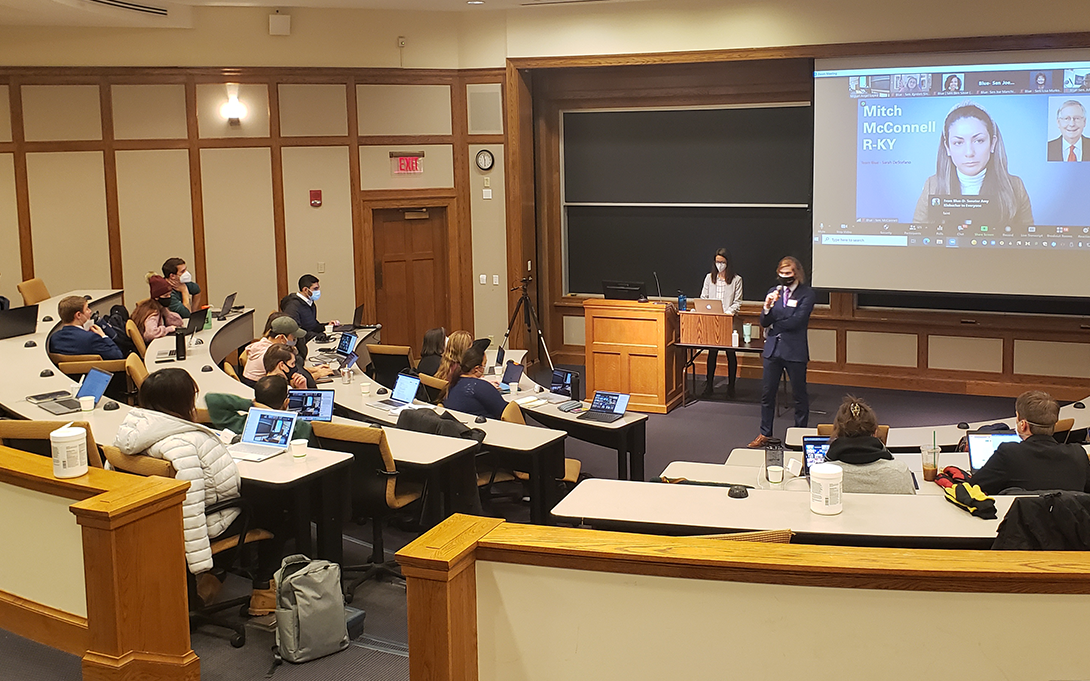
Excitement was in the air as some 150 senators, ambassadors and representatives of national and international interest groups eyed each other at an eventing meeting, anxious, suspicious, hopeful that a comprehensive immigration reform package, so long elusive, could be achieved through negotiations over the next two days.
While the Senate had many urgent issues to deal with, over the holiday break they heard from constituents that the time was right for immigration reform. That was the scenario they needed to address.
The scene was a Zoom call at the start of the 2022 Integrated Policy Exercise, attended by most first-year MPP students and assorted MPA and second-year MPP students. They were split into “Maize” and “Blue” groups, each comprising the politicians and interest groups, as well as ambassadors from concerned countries and journalists from a variety of outlets. Community norms were set. The students had roles that included points of view with which they personally may have disagreed, trying to understand the other side at least for the duration of the simulation. “We want this to be close to the real world, but not quite as rough. Be the best version of the role you are representing,” Ford School professor Ann Lin, coordinating the exercise, admonished.
Overnight, the ViewPoint simulation tool developed by Ford School professor Elisabeth Gerber was abuzz with news items from Univision, Vox, Fox and CNN reporting on the opening strategies of the two parties – “Democrats want comprehensive reform, Republicans focus on border security” – as well as press releases from some of those senators.
Early the next morning, the Democratic and Republican caucuses met to try to solidify their positions before drafting legislation. The omicron outbreak necessitated that the in-person meetings also included Zoom calls, so that every participant could have access to the discussions. Arrayed across classrooms, auditoriums, lounges, and hallways throughout Weill Hall, discussion groups with laptops aired their concerns.
One student, in the role of GOP Sen. James Lankford declared, “It’s a mess right now. But I think one thing the Democrats may agree upon is that building the wall is an infrastructure project.” Tom Tillis (R, NC - Naira Amin, MPP ‘23) said border security was the priority, a sentiment shared by John Hoeven (R,ND - Trevor Leatzow, MPP ‘23) and most of the GOP caucus. “I am concerned about the southern border, but also the border to the north of my state as well.”
Convening Democrats said they wanted a comprehensive package. Sen. Chris Coons of Connecticut (Margaret Walthall, MPP ‘23) said he wanted to make the situation at the border “more humane”. For Tammy Duckworth (D, IL - Anna Rymill, MPP ‘23), a combat veteran, guaranteeing access to citizenship for veterans was her priority.
Meanwhile, representatives of the AFL-CIO (Stephen Culbertson, MPP ‘23), Chamber of Commerce (Ramsay Ritchie, MPP ‘23), and National Restaurant Association (Lisa Cheung, MPP ‘23) huddled to align their messaging and the senators they were going to target. “A pathway to citizenship is good for the economy and for public safety,” according to the Chamber, while the union boss insisted that temporary workers in the U.S. needed to have their rights and safety protected.
The next phase of the exercise was drafting legislation. In a leadership meeting, Minority Leader Mitch McConnell (R,KY - Sarah DeStefano - MPP ‘23) said the Republicans could compromise on DACA, as long as their priorities of closing off asylum, greater border funding, immigration court reform and use of E-Verify for employers are met. Majority Leader Chuck Schumer (D, NY - James Hiebert, MPP ‘23) replied that the Democrats were a Big Tent party and there might be room for some compromise. Debbie Stabenow (D, MI - Emma Jabour, MPP ‘23) reflected her position as Chair of the Senate Agriculture Committee by reminding her colleagues that rural America had a massive demand for temporary immigrant labor.
Competing press conferences at mid-afternoon gave a glimpse of various proposals. Was it a bad omen that neither the “Coalition of moderate Democrats and Republicans” nor the “Republican Leadership with TBD Democrats” press conferences didn’t happen? The Rational Republicans for Visa Reform unveiled two bills, one which called for more seasonal visas and easier access to temporary visas for businesses, and one which included those proposals as well as a 40,000 cap on the number of asylum seekers. The “Common Sense Caucus” had four priorities: border security, increased temporary visas, and pathways to citizenship for Dreamers and non-citizen veterans. Lisa Murkowski (R, AK - Haley Kennedy, MPP ‘23) said her state would welcome more legal immigrant workers. “Our tax base benefits when we have more people working in Alaska,” she said. Lindsey Graham (R, SC - Nicholas Birdsong, MPP ‘22) said his proposal focused on the most important issue: border security.
After hearing the first set of proposals, some interest groups convened to push their agendas into the bills. The president of the U.S. Conference of Catholic Bishops, Joe Gomez (Dominic Coschino, MPP ‘23) noted, “The Rational Republicans' cap on asylum seekers and refugees has forgotten the word of God. The Bible says, ‘Treat the alien who resides with you no differently than the natives born among you; have the same love for him as for yourself." (LV 19:33-34). We must protect refugees.”
Afternoon media reports on ViewPoint noted potential agreements (temporary worker visas) and conflicts (DACA). The Hill ominously quoted a Republican senator about potential backlash to compromise: “My colleagues today are forgetting the most important audience from Mar-a-Lago...If [they] thought the threatening calls...were bad after the infrastructure bill, just wait and see what happens if they help Democrats pass immigration amnesty."
They had a hard deadline: By the end of the day, all legislation had to be submitted to the Senate Parliamentarian and Rules Committee (Professor Lin and GSIs Karissa Kresge, MPP ‘22, and Miguel Lopez MPP ‘23), who determined which bills would be sent to the Senate floor for debate and votes, with the encouragement that the more co-sponsors a bill had, the more likely it was to make it to the next phase.
Friday ended with a media extravaganza, where reporters shared their recaps of the day, reflecting on an early optimism that faded as the day wore on.
A tense and rare Saturday session of the Senate convened to consider the bills that made it through the vetting process. Of four submitted by each of the teams, only 2 total made it through the vetting. The morning began with debate about the bills and proposed amendments. Pathways to citizenship for Dreamers, veterans or essential workers? Foreign aid to Latin American countries? Vote-counting and trading got intense, in a myriad of physical and Zoom rooms, G-chats, ViewPoint postings, DMs and simply wandering around. How many red lines could be crossed? Could this historic opportunity be seized?
Univision reported on the lack of foreign funding: "$100 billion to border security but $0 to Central American Countries? Astonishing misuse of funds." says Honduras Ambassador Luis Fernando Suazo Barahona (Adam Payter, MPP ‘23). Central American governments are dismayed to learn that provisions to support countries to deal with the root causes of migration are being left out.
A Fox News report from the “illegal immigration summit” featured Minority Leader McConnell (Justin Fisher, MPA ‘22) who outlined the final GOP demands: funds for border enforcement, proscribed pathways for DACA and veterans, doing it “the American way.”
“Immigration is a bipartisan issue, It needs to be solved in a bipartisan way or it won’t happen,” Sen. Joe Manchin (D, WV - Fredrick Hernandez, MPP ‘23) said just before the final debate.
All participants convened together in one physical and one virtual room.
First up, the Blue team debate on the “Bipartisan Border Omnibus Act”. McConnell (DeStefano) introduced amendments to limit amnesty for the entire 12 million population of undocumented immigrants, which he said was irresponsible and wildly unpopular with the American people. The Democrats called it a bad faith, poison pill, noting the original proposal had been hammered out with the business, agricultural, labor and humanitarian communities. Notable cross-aisle votes: for the Democrats, Lindsey Graham (Birdsong), and for the Republicans, Kirsten Gillibrand (D, NY - Derek Zeigler, MPP ‘24). When the amendment passed on a simple majority, Democrats reconvened to assess their strategy. The final vote on the bill, as amended, with only 34 votes, the bill failed.
Next, the Maize debate on the “Bipartisan Border Solutions Act.” Sens. Manchin (Hernandez) and Sinema (Anna Kelly, MPP ‘23) were a part of the Democratic coalition, and Sens. John Cornyn (R,TX - Michael Hauser, MPP ‘23), Rick Scott (R, FL - Samir Deshpande, MPP ‘23) and Mitt Romney (R-UT, Ryan Fogarty, MPA ‘22) were co-sponsors. She noted the key components: millions for border security with new technology, a pathway for Dreamers and veterans, improving humanitarian conditions for those already at the border and expanded processing centers. Sen. Stabenow (Tim Stark, MPP ‘23) appealed to the party’s progresive wing: “Don’t let perfect be the enemy of the good This is just a start.” Despite wide bipartisan praise for the bill, detractors from the right urged rejection. Nevertheless, the bill received 68 aye votes! Comprehensive immigration reform achieved!
Applause and waves filled the rooms. And a collective sigh of relief at the end of two arduous days of learning, debating and bonding.




